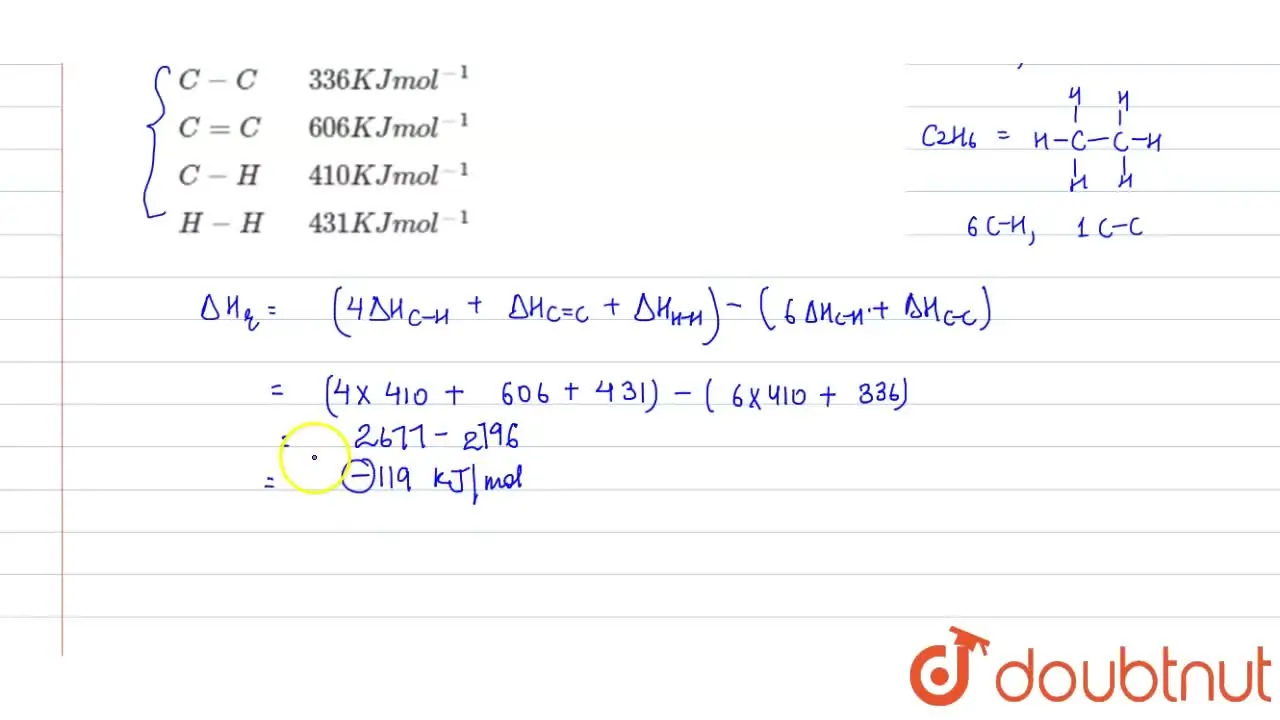Using the bond enthalpy data given below, calculate the enthalpy change for the reaction
C2H4(g)+H2(g)→C2H6(g)
Data:BondBond enthalpyC−C336KJmol−1C=C606KJmol−1C−H410KJmol−1H−H431KJmol−1
Diagrammatically, we represent the given reaction as follows:
ΔHr=(4ΔHC−H+ΔHC=C+ΔHH−H)−(6ΔHC−H+ΔHC−C)
=(4×410+606+431)−(6×410+336)
=2677−2796
=−119KJ/mol.
Related Playlists
Similar Questions
The enthalpy change for the reaction 2C(graphite)+3H2(g)→C2H6(g) is called
View SolutionThe enthalpy change for the reaction, C2H6(g)→2C(g)+6H(g) is X kJ. The bond energy of C-H bond is :
View SolutionUsing the bond enthalpy data given below, estimate the enthalpy of formation of gaseous isoprene
CH2=C∣CH3−CH=CH2
DataBond enthalpy ofC−Hbond=413.38KJmol−1Bond enthalpy ofC−Cbond=347.69KJmol−1Bond enthalpy ofC=Cbond=615.05KJmol−1
Enthalpy of sublimation of carbon (graphite) =718.39KJmol−1
Enthalpy of dissociation of H2(g)=435.97KJmol−1View SolutionThe enthalpy change for the reaction H2(g)+C2H4(g)→C2H6(g) is ……………… The bond energies are, H−H=103,C−H=99,C−C=80 & C=C=145K cal mol−1
View SolutionUse the bond enthalpies listed below to estimate the enthalpy change for the reaction
H2(g)+Br2(g)→2HBr(g)
Given:
BE of H2,Br2, and HBr is 435,192, and 372kJmol−1, respectively.View SolutionCalculate the enthalpies change for the reaction,
H2(g)+Cl2(g)→2HCl(g)
Given that, bond energies of H-H,Cl-Cl and H-Cl are 436, 243 and 432 kJ mol−1View SolutionDetermine the enthalpy change for the given reaction.
CH4(g)+Cl2(g)→CH3Cl(g)+HCI(g)
Bond energies are given as follows:
C−H=412kJmol−1
C−CI=338kJmol−1
CI−CI=242kJmol−1
H−CI=431kJmol−1.View SolutionCalculate the enthalpy change during the reaction :
H2(g)+Br2(g)→2HBr(g)
Given, eH−H=435kJmol−1,eBr−Br=192kJmol−1 and eH−Br=368kJmol−1.View SolutionGiven the bond energies N−N , N−H and H−H bond are 945,436 and 391KJmol−1 respectively, the enthalpy change of the reaction
N2(g)+3H2(g)→2NH3(g) isView SolutionCalculate enthalpy change of the following reaction :
CH2=CH2(g)+H2(g)→CH3−CH3(g)
The bond energy of C - H, C - C, C = C, H - H are 414,347,615and436kJ mol−1 respectively.View Solution


